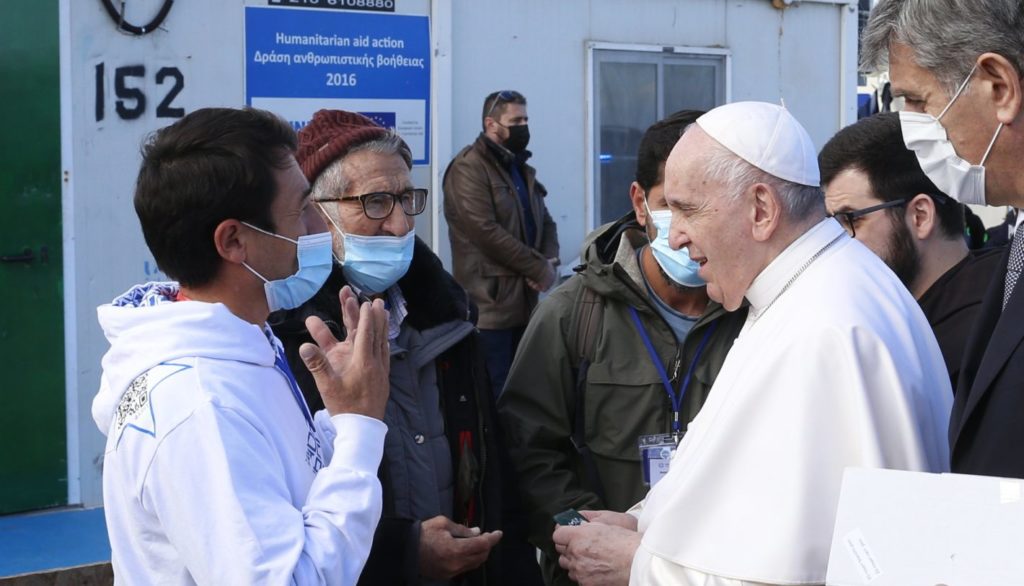On Sunday morning, Pope Francis traveled from Athens to Mytilene, Lesbos, where he arrived around 10.10 a.m. to go to the "Center for Reception and Identification", for the meeting and his speech to the refugees hosted there. In this refugee camp live about 3000 people, mostly from Afghanistan.
In Lesbos, five years later
During his visit to the Kara Tepe refugee camp, the Pope listened to the testimonies of some volunteers and refugees such as Tango Mukalya, from the Democratic Republic of Congo. He arrived in Lesbos on November 28, 2020. He is 30 years old and has three children. "I am addressing you," he said to Pope Francis, "first of all, to thank you for the fatherly concern and spirit of humanity you show towards us, your migrant and refugee children, currently in Lesbos, Greece, and all over the world. May God reward you a hundredfold. At the same time, I thank the government and the people of Greece for the humanitarian spirit with which they have welcomed me, giving me peace, shelter and the necessities of life, despite some difficulties. I cannot forget the parish of the Catholic Church, my present parish of Mytilene in Lesbos, which lovingly supported me as a child and where I pray to God our Lord. I entrusted our difficult moments to God. With the strength of prayer and the intercession of the Virgin Mary, our Mother and Mother of the Church, I was able to overcome the difficulties I encountered in my life as a refugee."
"Addressing the root causes."
Pope Francis, after thanking the testimonies heard, addressed to humanity some words of considerable harshness. In particular, he appealed to stop talking about the problem of migration and to talk more about the problem of arms trafficking that encourages it. He also strongly criticized nationalism and called on the international community to seek coordinated solutions because global problems such as pandemics and migration require global responses.
"They do not speak of the exploitation of the poor, of the forgotten and often abundantly financed wars, of the economic agreements made at the expense of the peoples, of the covert maneuvers to traffic arms and proliferate their trade. Why do we not speak of this? We have to address the root causes, not the poor who pay the consequences, even being used for political propaganda!". "Shutting down," he said, "and nationalisms - history teaches this - lead to disastrous consequences. It is sad to hear that the use of community funds to build walls or barbed wire fences is proposed as a solution. We are in the age of walls and barbed wire fences". "The Mediterranean, which for millennia has united different peoples and distant lands, is becoming a cold cemetery without tombstones. This great space of water, cradle of many civilizations, now seems a mirror of death. Let us not allow the 'mare nostrum' to become a desolate 'mare mortuum'".
In Athens, "life is called to conversion".
At the end of the meeting, he returned to Athens. There, in the afternoon, at 4:45 p.m., the Eucharistic celebration took place in the Megaron Concert Hall, where about 1,000 people were able to participate. During the homily, Pope Francis reflected on the figure of John the Baptist. He also recalled that the Church is in the period of preparation for Christmas and therefore spoke about personal conversion and how to carry it out.
"We ask for the grace to believe that with God things change, that He heals our fears, heals our wounds, turns dry places into springs of water. We ask for the grace of hope. For it is hope that rekindles faith and revives charity. For it is hope that the deserts of the world are thirsting for today".
"And while this meeting of ours," he continued, "renews us in the hope and joy of Jesus, and I rejoice to be with you, let us ask our Mother, the All Holy One, to help us to be, like her, witnesses of hope, sowers of joy all around us - hope, brothers, never disappoints, never disappoints - not only when we are happy and together, but every day, in the deserts we inhabit. For it is there that, with God's grace, our life is called to conversion. There, in the many deserts within us or around us, life is called to flourish. May the Lord give us the grace and courage to accept this truth".
At the end, he returned to the nunciature where he received the courtesy visit of His Beatitude Ieronymus II.













